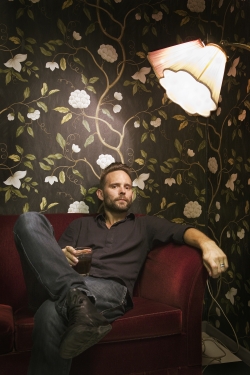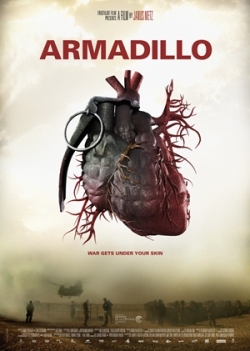interviewUno Helmersson
Uno Helmersson is a Swedish guitarist and composer. He has written music for films, TV and commercials. His resume
includes projects like Fra Thy til Thailand, Honungsfällan and Tine pä Tvaer.
In 2006 he began his work as the assistant
of Johan Söderqvist's on The Monestary - Mr Vig & the Nun. Since then they have collaborated on a lot
of Söderqvist's scores.
Maintitles took the opportunity to ask him some questions about his collaborations with Söderqvist and his own music.
MT: Can you tell me something about your musical background?
I come from a family with great interest in music and art. Therefore I've always been supported in the choices I made.
When I was about fourteen years, I made up my mind and decided that I wanted to work as a musician and a composer.
So from there I took different music classes and made my way through different part-time works.
I ended up at the Royal College of Music in Stockholm and got into film music composing.
MT: How did you and Johan meet?
When I studied string arranging at the college, I told my teacher about my interest in composing for film.
He had heard parts of my work, and recommended me to Johan. This was in 2006. I remembered my first call to Johan;
I was quite nervous because of his great profession and me being a student with less experience in film composing.
But as it went along, he decided to try me out and here we are now.
MT: Describe your daily work as an assistant of Johan?
Depending on where in the process of film composing we are, there are different tasks.
It is all from creative tasks as recording and developing sampling libraries, doing mock-ups, arranging cues,
creating ambiences, to more ad hoc-work like building up a ProTools-studio and preparing for the final music mix.
So my main workflow is mostly about making everything work as smooth and fast as possible when things get hot.
MT: You've co-scored a short film called Honungsfällan with Johan. How was this compared to working as an assistant?
What we did on Honungsfällan, was a tryout on working together on split-basis.
Honungsfällan was a good project to try collaborating on writing the score. The main difference was of course the fact
that we shared task of composing. Despite this, Johan was the music director and he had the final call on finishing all the music.
Working for and with Johan is very creative and sometimes a great challenge. Altogether, I've learned a lot by working for Johan,
and it has given me a great knowledge about the process of composing music for feature films. I owe a great part of my identity as a
composer to Johan.
MT: You've composed the music to a series of shorts and documentaries. Do you intend to start composing for feature films in the future?
Of course! That is the natural next step for me in my career.
MT: In the meantime, you have composed the music to Armadillo. Can you tell me something about the documentary and its music?
Armadillo is a documentary about war and what makes you human. It's about how you react in extreme situations and
how you're pushed
to the extreme limit of what's ok. You follow a couple of Danish soldiers through their twelve months of ISAF military service in Afghanistan.
You see what they are going through. The aesthetics of the film are cinematic and this puts the documentary in an interesting perspective.
You are experiencing something real, but it still feels like a fictional piece of cinema. This is the strength of this film, besides the fact
that it takes the art of documentary to a completely new level. The war we are used to see in cinema is either fiction or retrospective
documentaries. But there is a lot going on in the world of documentaries right now...
The music of this film is also really cinematic and I like to think of the score as the music of the soldiers; as being
their state of mind and the things they go through. Of course the music in this film has a different function, but I
think that is the general purpose of the music. When you listen to the score, you'll notice it's quite dark and ambient,
with almost a lack of any themes. There actually is one theme, which is played by a cellist (Anna Dager). In the process of
making the score this became the theme of the film. It has been a real pleasure working on this film, which is really a masterpiece
that was created by Janus Mets and the rest of the crew. And last of all I want to show my gratitude to my friend, partner in crime,
and mentor - Johan Söderqvist, who actually made it all possible for me.
MT: What tools did you use to develop the ominousness for the score?
Well, I generally use Logic pro for my creative part of composing the music. I think it's good to let go of all conventions
and throw your self a carte blanche in the beginning of the process. It's difficult to explain how I created the sound of the score,
because it would take a lot of text and effort to describe. But with the use of my DAW I was able to create a large portion of
the soundscape music. I recorded and processed them in a lot of different ways.
MT: The documentary won the 'Grand Prix of Cannes Critics Week'. That must have felt good?
Yes, it sure did! It also put some extra pressure on me when Armadillo got the price.
The thing was, when they got the film into Cannes, the production company made the decision to have me make
two versions of the score. This deadline shortened my work by two months. I did not have the chance to fix a
complete score on such a short notice. Therefore, the Cannes version is containing bits and pieces (about 16 % of the score)
of Johan Söderqvist's score from Lät den Rätte Komma In (Let The Right One In). Johan is credited as music editor ^
in both film versions.
The company had the allowance to use the music for that version, but we needed to make a complete score with the orchestral
parts and with my music in the centre.
MT: Armadillo sparked a furious debate in Denmark. The Danish minister of defence had to defend the ethics of how to behave in combat situation... What's your view on this??
As a Swedish citizen, I have followed this debate on the Internet and talked to my Danish friends.
But there is a lively debate in Sweden as well. Just a couple of days ago, once again a Swedish soldier got killed.
The Swedish news told that approximately half of the Swedish citizens wants to bring home our soldiers from Afghanistan.
Armadillo is an important film because it illustrates war and what it makes us do. In a war you find yourself in extreme
situations and you act likewise. I think no one can be prepared for this. There are a lot of aspects to consider in this,
such as group pressure, the stress, personal psyche, etc.
I believe in the act of non-violence and that's why it makes me sad to see the people, who haven't chosen the war, tangled up in between
the soldiers and the Taliban. Just imagine the pressure and lack of trust that a person carries with him while being on such a mission.
Whether you are pro or against the act of war, you have to consider the ethics of it; Who is it for? Why do we do it? Is this a
final solution? Is it worth the sacrifice?


Interview
Joep de Bruijn (taken between December 2009 and November 2010)Website
www.unohelmersson.com/More interviews
Interview with Johan SöderqvistBack to overview
